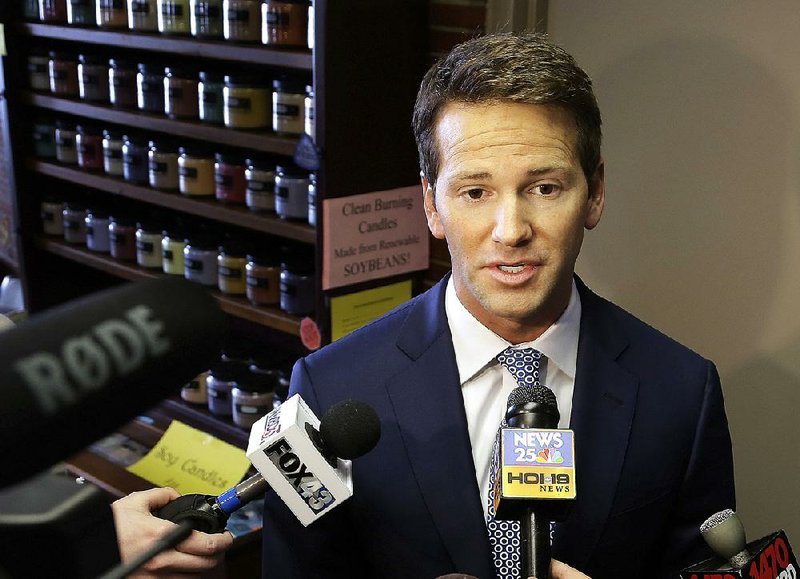WASHINGTON -- Illinois Rep. Aaron Schock abruptly resigned Tuesday after a month-long cascade of revelations about his business deals and lavish spending on everything from overseas travel to office decor in the style of the television series Downton Abbey.
"I do this with a heavy heart," Schock said in a statement. He said he had given the people of his Peoria-area district his all since his election in 2008, "but the constant questions over the last six weeks have proven a great distraction that has made it too difficult for me to serve the people of the 18th District with the high standards that they deserve and which I have set for myself."
Schock, 33, a young, media-savvy Republican, had come under scrutiny for extravagant spending, payments to donors for flights on private jets and improperly categorized expenses.
The questions raised have included Associated Press investigations of his real estate transactions, air travel and Instagram use. On Monday, the AP confirmed that the Office of Congressional Ethics had reached out to Schock's associates as it apparently began an investigation.
In a statement, House Speaker John Boehner said: "With this decision, Rep. Schock has put the best interests of his constituents and the House first. I appreciate Aaron's years of service, and I wish him well in the future."
Schock did not inform any House leaders before making his decision, and the announcement took Republicans by surprise. Although the questions around his spending had begun to attract attention and raise concerns, he was not yet facing concerted public pressure from party members to step down.
He is the second House Republican to give up his seat this year under unfavorable circumstances. Michael Grimm, who pleaded guilty to tax evasion charges, resigned his New York seat in early January.
Illinois Gov. Bruce Rauner will have five days from the March 31 effective date of Schock's resignation to schedule a special election, which must be held within 120 days of the vacancy.
GOP state Sen. Darin LaHood is considered the front-runner to replace Schock in the heavily Republican district. LaHood is the son of Ray LaHood, who served in Congress and later as President Barack Obama's transportation secretary.
Schock, an energetic real estate investor who catapulted from the Illinois Legislature to win a congressional seat at the age of 26, touted his status as the House's first millennial lawmaker.
He posed shirtless for Men's Health magazine to promote fitness and used Instagram the way older politicians rely on news releases. He was an in-demand fundraising force and visited more than 40 congressional districts in the lead-up to November's elections.
Last June, he was brought into the House leadership and named a senior deputy whip.
But Schock's fall was even swifter. Only weeks ago, a Washington Post report about his Downton Abbey-style office decor led to questions about his handling of expenses. The ornate redecoration, replete with 1920s-era touches, cost $40,000 and was charged to his office; faced with questions, Schock repaid the expense.
After that, an AP examination of Schock's frequent flights around his central Illinois district found that he spent more than $40,000 from his House expenses for travel on planes owned by a group of donors. He also attended concerts and festivals where a super political action committee supporting his campaign spent more than $24,000 for tickets, the AP found.
A separate AP story detailed how Schock has relied on several political donors for almost all of the Peoria-based real estate deals that have provided much of his personal wealth, estimated to be about $1.4 million in 2013.
Since Schock doesn't plan to formally resign until March 31, the Office of Congressional Ethics could still refer its findings before then to the Justice Department's Office of Public Integrity or the Federal Election Commission. Once his resignation becomes final, congressional investigators would lose jurisdiction.
Information for this article was contributed by Stephen Braun, Jack Gillum, Matthew Daly, Philip Elliott, Alan Fram, Donna Cassata and Kerry Lester of The Associated Press.
A Section on 03/18/2015

